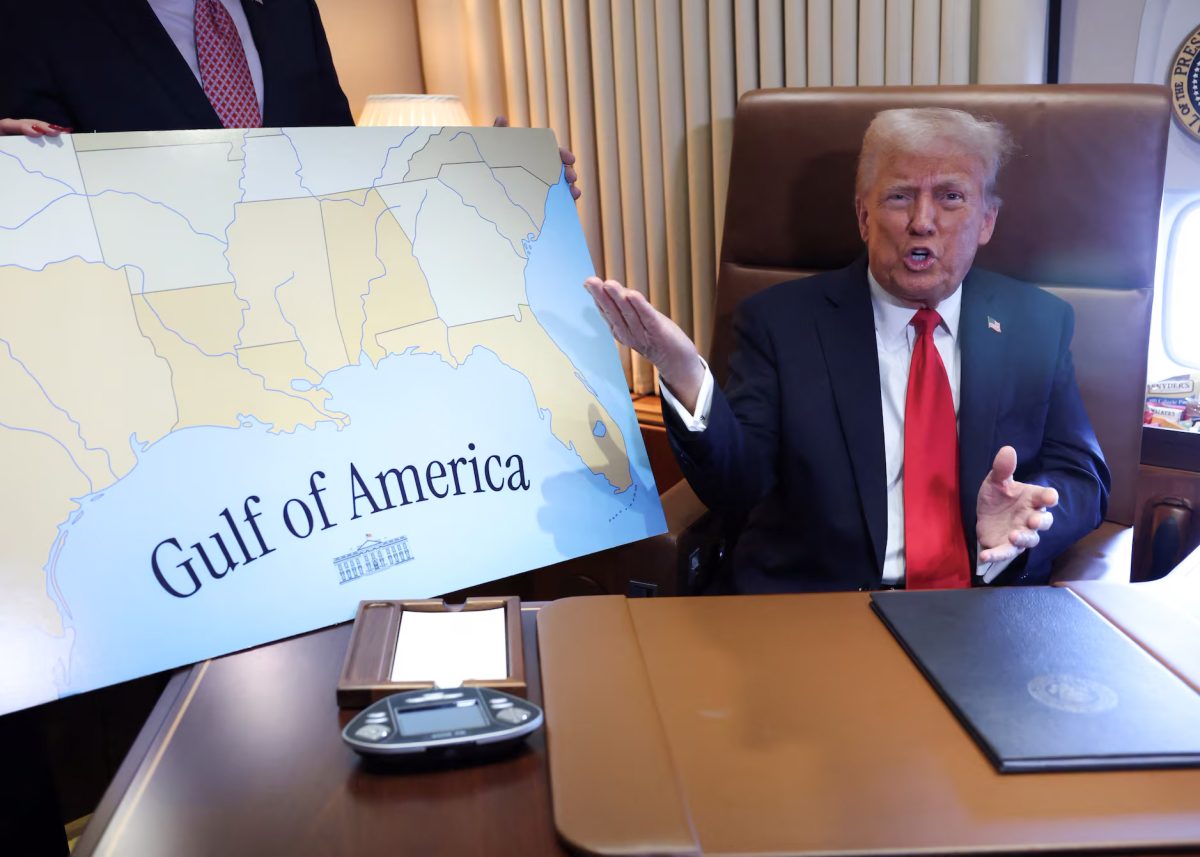So, it’s official: courtesy of President Donald Trump’s Executive Order 14172, when you look up ‘Gulf of Mexico’ on Google, ‘Gulf of America’ will come up instead. What has changed to warrant this? Has the United States gained any more power or become any more renowned by its neighbors? Not really — in fact, although the name change may seem like a promotion of American greatness, this political stunt simply undermines the country’s status by deteriorating foreign relations and threatening the U.S. economy.
By swapping out ‘Mexico’ for ‘America,’ the U.S. is deliberately stroking its own ego at Mexico’s expense. Tensions between the U.S. and Mexico are already high for a multitude of reasons. It is nothing new for America to claim that other countries’ territories belong to them to push anti-immigration and American imperialist rhetoric.
Ita Berg (I) agrees that this name change has larger imperialist implications. “It represents President Trump’s dangerous policy of imperialism and aggression,” Berg argues. “Renaming the gulf the Gulf of America is claiming it as American territory, even though it is officially considered international waters, which sets a dangerous precedent, especially considering the fact that Trump has proudly announced plans to annex Greenland and the Canal Zone.” As Berg suggests, this name change is the first domino in a long line of imperialist plans which are problematic as they lead to violence and suppression of other sovereign nations and people. One only had to look to America’s violent annexation of Hawaii for a reason to resist any suggestion of expanding our borders.
Additionally, although Trump may call the country “very dangerous” and “in a lot of trouble,” Mexico is still our biggest trade partner and one of our greatest oil suppliers. America cannot afford to lose Mexico, but right now it is doing just that. America, in fact, is pushing Mexico into the arms of … China? Yes, even though it seems so far-fetched, our greatest competitor’s influence in Latin America has been growing fast, becoming South America’s greatest trading partner at the turn of the century. The U.S.’ stubborn insistence on calling it ‘Gulf of America’ may be a catalyst for Latin America to break ties with it entirely and join the opposition.
It is not just Latin America: this name change will leave a bad taste in other countries’ mouths, making the U.S. a less palatable ally. To change the name of a location in the U.S.’ own favor does not make it seem any more heroic or powerful — it makes the U.S. look petty and weak. The U.S. may seem like a threat, but not the dangerous or respected kind. The name change has instead made it seem avoidant and untrustworthy. Why should other nations believe that the U.S. wants to help anyone but itself? This misfire will only further isolate it from the rest of the world and contribute to its cutoff from the circulation of trade.
Amidst this geopolitical conflict, companies are getting caught in the crossfire because they have to decide whether or not to adopt the new name. What they call it does matter — big tech companies like Google are more than just regurgitators of information. Their voices have actual leverage and influence, so people will form opinions of them based on what they say.
Even though Google’s swift transition from ‘Mexico’ to ‘America’ may have had more to do with not wanting to violate a president’s order than its actual political stance on the matter, it is very easy for the public to assume that it will continue to vehemently follow whatever Trump has to say, souring its reception with millions of non-Trump supporters. “The fact that powerful people and organizations in the United States are complying without question suggests that they will accept future imperialist measures that are more violent and disruptive than this,” Berg adds, illustrating how companies who abided by this name to avoid being censored by the government will continue to obey whatever the government obeys, even if it strays into violence.
So, if America is losing Mexico’s partnership and unnecessarily forcing corporations to politicize themselves, what exactly are the American people getting in return? Nothing. At the end of the day, people will not actually call it the ‘Gulf of America.’ Certainly not anyone outside of America, since the name change only applies in the U.S., and all other nations can call it whatever they want. Then what about the American populus? It is difficult for the government to rebrand something that has been called the same thing for the past four centuries on a whim and expect everyone else to keep up. “It’s kind of like Twitter,” Emily Yu (I) comments. “When it changed to ‘X’, people were still calling it Twitter.”
It is not worth burning our bridges with our most important allies and jeopardizing our economy just for a shiny new name on a digital map.
Categories:
It’s Still the Gulf of Mexico
By Angelina Tang (II), Contributing Writer
March 26, 2025
0








